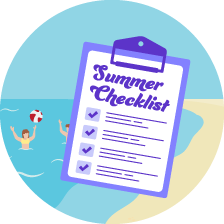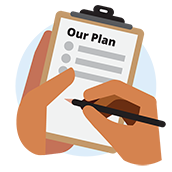Get summer ready
Emergencies can happen anytime, anywhere, even while we’re on holiday.
Now is the best time to prepare and update your plan to keep you and your whānau safe over summer.
On this page
Own your zone
All of New Zealand's coastline is at risk of tsunami. Remember, if an earthquake is Long or Strong, Get Gone. After a Long or Strong earthquake, move immediately to the nearest high ground, out of all tsunami evacuation zones, or as far inland as you can.
Know your tsunami evacuation zones. Make sure you know where to go, whether you are enjoying a stay-cation or going on holiday.
Find your tsunami evacuation zone
Work out what supplies you need at home

If you're at home, you probably have most of the things you need already. You don’t have to have them all in one place, but you might have to find them in a hurry and/or in the dark.
- Water for three days or more — make sure you have at least nine litres of water for every person. This will be enough for drinking and basic hygiene.
- Long-lasting food that doesn’t need cooking (unless you have a camping stove or gas barbecue) and food for babies and pets.
- Toilet paper and large plastic buckets for an emergency toilet.
- Work gloves and a properly-fitted P2 or N95 mask.
If you have special dietary needs, make sure you have enough to last three days at home.
Don't forget that you and your neighbours can help each other by sharing supplies too.
Your summer checklist

If you're going away this summer, make sure you have what you need. You might not be able to get home or you might be stranded in your car for some time.
Your car should have:
- Walking shoes, warm clothes, raincoat and hat (for each person)
- Water and snack food (remember babies and pets too)
- Hand sanitiser
- Portable phone charger
- Cash
- Copies of important documents and photo ID
- Sunblock
- RAT tests
- Medications
- First aid kit
- Torch and batteries
Be prepared for good weather... and bad
Summer can brig all kinds of weather. Before travelling, ensure you're ready in case severe weather hits.

Keep an eye on the weather
MetService have up-to-date weather forecasts. Before you travel, make sure you check the forecast.
CHECK YOUR WEATHER FORECAST
Keep up to date with traffic updates
Plan your journey with Waka Kotahi. See what traffic updates or delays are on your route.
PLAN YOUR JOURNEY
Prepare your property for severe weather
If you're heading away, make sure your property is prepared for severe weather. Tie down or remove anything outside that could become a damaging missile or break in strong winds.

Be aware of Weather Warnings and Alerts
MetService provides land-based severe weather alerts. These are issued through a system of Outlooks, Watches and Warnings. Check what weather alerts are in place for where you are.
CHECK FOR WEATHER ALERTSKnow how you'll stay informed
It's important to know the different ways you can stay informed during an emergency, no matter where you are. Do you know which radio frequency to tune into?
SEE HOW YOU CAN STAY INFORMED
Protect your property from wildfire
You don’t need to live in a rural area to be at risk from wildfire. If there’s vegetation close by and potential for someone to generate a spark, then there’s a wildfire risk.
Don’t wait until there’s smoke in the air to prepare. Help protect your property from wildfire.
- Keep your grass short and green, if possible, around buildings on your property.
- Keep gutters and areas around decks clear of dead leaves, debris and pine needles.
- Remove highly flammable plants close to buildings on your property. This includes avoiding bark mulch or similar ground coverings.
- Plant low flammability plants.
- If you have a RAPID number, make sure it is visible at your property entrance. Your accessway must be wide enough for a fire engine (4m wide by 4m high).
Check it's alright before you light
Summer heat brings increased fire risk. Fire and Emergency New Zealand have a three-step tool to let you know whether it’s safe to light a fire, and if you’ll need a fire permit.
CHECK BEFORE YOU LIGHT A FIRE
Get Ready
There are simple steps you can take to make sure you and your whānau are ready to get through.



